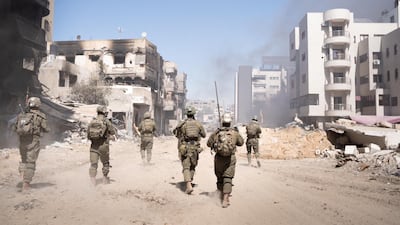EU foreign affairs ministers and their Gulf counterparts will meet in Luxembourg next month to discuss regional security issues, European officials have told The National.
The continuing war in Gaza is likely to be high on the agenda as the bloc struggles to mend diplomatic ties with the Arab region that have been undermined by accusations of double standards on the conflict.
The April 22 meeting will take place after a regular meeting of the EU's 27 foreign affairs ministers. They have asked EU foreign affairs minister Josep Borrell to invite their Israeli counterpart Israel Katz to brief them on the war.
“The EU and GCC foreign ministers will come together for the first high-level forum for regional security and co-operation which will take place in the evening of April 22 in Luxembourg, back to back with the Foreign Affairs Council,” a senior EU official told The National.
“We can confirm that the high-level forum will take place on April 22,” said Peter Stano, the EU's lead foreign affairs spokesman. “We will announce further details closer to the date.”
The meeting is likely to include discussions on the Gaza conflict and the EU's naval mission to the Red Sea that aims to defend commercial shipping from Houthi attacks.
Officials decided to organise a high-level forum in October at a meeting in Muscat attended by Mr Borrell and senior Arab officials including GCC secretary general and Kuwaiti diplomat Jasem Al Budaiwi .
At the time, joint working groups were set up to co-ordinate efforts on security topics including counterterrorism and irregular migration.
There has been a diplomatic push to implement a strategic partnership between the EU and the GCC which was launched in 2022.
The partnership was a wide-ranging agreement to strengthen security, economic and energy relations. It was followed by the appointment in May of the first EU special envoy to the Gulf, Luigi di Maio.
Mr Di Maio told The National last month that Gulf states have the expertise that could help end the war in Gaza and pave the way for a two-state solution.
The urgency of the war is expected to dominate talks between EU and Gulf officials as Arab criticism of the West's so-called double standards on the conflict has surfaced in the past months, said Emily Tasinato, a researcher and analyst focused on politics and security in the Arabian Peninsula and the Gulf region.
“The key question now is: can the EU regain credibility in the eyes of its Arab partners as an actor that acts according to human rights and moral values?” asked Ms Tasinato. “Or has its credibility been irreversibly damaged?”
The EU struggled for months before agreeing on a call for a ceasefire last week due to internal divisions, angering Arab countries that have pointed out the bloc's contrasting prompt condemnation of Russia's full-scale invasion of Ukraine in 2022.
The EU was also slower than the US and the UK in agreeing to sanction extremist Israeli settlers in the West Bank – a symbolic measure that is viewed as possibly increasing political pressure on Israel to scale down the number of civilians killed in the war.
The EU's lack of unity on the Middle East conflict is “the primary obstacle hindering the bloc's ability to lead an effective diplomatic effort”, said Ms Tasinato.
However Mr Borrell and other officials have also repeatedly expressed interest in working with Arab partners in finding a political solution for Gaza that excludes Hamas.
Speaking in November, Mr Borrell said that achieving a two-state solution, which is the EU's long-standing position on the conflict, “will require a coalition for peace, including the European Union – of course – but also the United States, the key states of the Arab League which have the confidence [of] both the Palestinians and Israel, to implement the parameters of a negotiated settlement.”
“The EU wants to be viewed as a partner supportive of Arab diplomatic efforts,” said Ms Tasinato.
Close to 33,000 people have died as a result of Israel's retaliatory war against Gaza after Hamas-led attacks on Israel on October 7 that killed around 1,200 people. A UN special rapporteur recently accused Israel of committing “at least three” of the five acts proscribed in the Genocide Convention.

